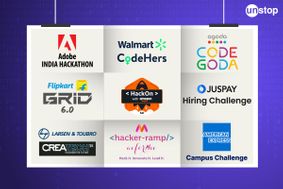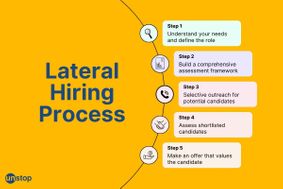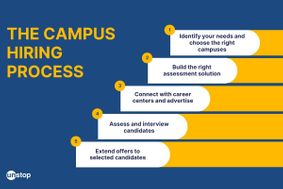- Top Employee Onboarding Software
- Why Use Employee Onboarding Software?
- Key Features of Effective Onboarding Software
- How To Choose The Right Onboarding Software?
- Which is the Best Onboarding Software?
- Frequently Asked Questions (FAQs)
- What Is Upskill And Reskill?
- Difference Between Reskilling And Upskilling
- Upskilling for Workplace Advancement
- Reskilling for Career Transformation
- Crafting Successful Upskill and Reskill Strategies
- Upskill And Reskill Strategizing: Things to Keep in Mind
- Measuring the Impact of Skill Development Initiatives
- Frequently Asked Questions
- What’s a Skill Gap?
- Employee Skill Gap Analysis: Why Do We Need It?
- How To Conduct Employee Skill Gap Analysis?
- Addressing Skill Gaps Through Training and Hiring
- Utilizing Skills Gap Analysis for Strategic Planning
- Leveraging Employee Skill Gap Analysis: Things To Keep In Mind
- Frequently Asked Questions
- Transformative Role of AI in Talent Acquisition
- Impact of AI on Business Recruiting
- Overcoming Challenges in AI-Driven Talent Acquisition
- Starting with AI in Talent Acquisition
- Future Landscape of AI in Talent Acquisition
- Frequently Asked Questions
- HR In The Hot Seat - Challenges With Evolving Workforce
- Mastering Effective HR Management: Tips For Overcoming Challenges
- Summing Up
- The Future of HR: Key Trends for 2024
- Skill-Based Hiring
- Prioritizing Employee Experience, Engagement & Well-being
- AI-Empowered Workforce Evolution and Its Impact
- Taking Diversity, Equity, and Inclusion Beyond Mandates
- Hybrid and Remote Work
- Embracing the Gig Economy and Blended Workforce
- Transparent HR Practices
- Climate Change Adaptation in HR Practices
- Leveraging HR Analytics for Data-Driven Decisions
- Continuous Learning & Development to Improve Productivity
- The Office Buzz in 2024
- Bottom Line - HR Operating Model Needs A Shift
- Importance and Impact of Recognizing Employee Birthdays
- Professional Birthday Wishes for Employees (All Experience Levels)
- Personalized Birthday Wishes for Employees in Different Roles
- Fun Birthday Wishes for Employees (with Templates)
- Birthday Wishes for Remote Employees
- Heartfelt Birthday Wishes for Employees
- Belated Birthday Wishes for Employees
- Simple & Sweet Birthday Wishes for Employees
- Celebrating Employee Birthdays: Ideas and Traditions
- Tips and Ideas for Sending Birthday Wishes to Employees
- Closing Thoughts
- Frequently Asked Questions
- What Is An Employee Referral?
- Benefits of Implementing Employee Referral Programs
- Setting Up an Effective Employee Referral Program
- Employee Referral Email
- Employee Referral Scheme
- Overcoming Challenges of Employee Referrals
- Companies with Best Employee Referral Programs
- Employee Referral Programs: Best Practices
- Closing Thoughts
- Frequently Asked Questions (FAQs)
- Importance of Team Building Activities
- Types of Team Building Activities
- Outdoor Team Building Activities for Employees
- Indoor Team Building Activities for Employees
- Easy Team Building Activities for Remote Employees
- Team Building Activities For New Employees (Icebreakers)
- Fun Team Building Activities for Different Goals
- To Boost Communication and Collaboration
- To Reduce Stress Levels and Promote Well-being
- Aligning Team Purpose and Values with Strategic Activities
- Final Remarks
- Frequently Asked Questions
- Importance of Employee Appreciation Quotes
- Work Appreciation Quotes for Employees
- Employee Appreciation Quotes for Hard Work Recognition
- Employee Appreciation Quotes for Teamwork and Collaboration
- Appreciation Quotes for Celebrating Employee Anniversaries and Milestones
- Employee Appreciation Quotes for Strong Work Ethics
- Employee Appreciation Quotes for Project & Goal Completion
- Employee Appreciation Quotes for Quality of Work
- Employee Appreciation Quotes for Creativity and Innovation
- Appreciation Quotes for Managers
- Peer-to-Peer Employee Appreciation Quotes
- Appreciation Quotes for Employees Leaving the Company
- Employee Appreciation Quotes for Thoughtful Gestures
- Funny Employee Appreciation Quotes
- Short Employee Appreciation Quotes
- Employee Appreciation Quotes for Different Roles
- Employee Appreciation Quotes for Senior Leadership
- Creative Ways to Use Employee Appreciation Quotes
- Summary
- Frequently Asked Questions (FAQs)
- What is Employee Satisfaction?
- Importance of Employee Satisfaction
- Objectives of Employee Satisfaction
- Employee Satisfaction vs. Employee Engagement
- Key Reasons for Employee Dissatisfaction
- Strategies for Improving Employee Satisfaction
- Ways to Measure Employee Satisfaction
- Best Practices for High Employee Satisfaction
- Final Remarks
- Frequently Asked Questions (FAQs)
- How to Craft Effective Employee Appraisal Comments
- Key Areas to Focus in Performance Review
- Comments On Hard Work & Dedication
- Assessing Interpersonal Skills
- Evaluating the Ability to Collaborate & Work in Teams
- Gauging Punctuality
- Commenting on Communication Style
- Reviewing Time Management and Productivity
- Leadership in Performance Appraisals
- Assessing Creativity & Innovation
- Evaluating Problem-Solving Abilities
- Recognizing Flexibility and Dependability in Reviews
- Employee Appraisal Comments for Different Roles
- Summary
- Frequently Asked Questions (FAQs)
- Employee Grievance Meaning
- Importance of Employee Grievance Process
- Types of Workplace Grievances
- Reasons for Employee Grievances
- Employee Grievance Procedure
- Steps in the Employee Grievance Handling Process
- Employee Grievance Form Example
- Final Remarks
- Frequently Asked Questions (FAQs)
- What is Company Culture?
- Importance of Company Culture
- Types of Company Culture
- Factors Contributing to Organizational Culture
- Assessing & Developing Corporate Culture
- Company Culture - It’s not just Perks or Feels
- Good Company Culture Examples
- Developing Company Culture: Best Practices
- Closing Thoughts
- Frequently Asked Questions (FAQs)
- What is Employee Empowerment?
- Benefits of Empowering Employees
- Employee Empowerment vs. Micromanagement
- Strategies for Effective Employee Empowerment
- Role of Managers in Fostering Empowerment
- Organizational Structure Supporting Empowerment
- Overcoming Barriers to Employee Empowerment
- Frequently Asked Questions (FAQs)
- What is Employer Branding?
- Importance of Employer Branding Strategy
- How to Build an Employer Branding Strategy?
- Strategies for Building a Strong Employer Brand
- How to Measure and Boost Your Employer Branding Success?
- Examples of Strong Employer Brand Strategy
- Best Practices for an Effective Employer Branding Strategy
- Closing Thoughts
- Frequently Asked Questions (FAQs)
- What are Employee Wellness Programs?
- Importance of Employee Wellness Programs
- Examples of Employee Wellness Programs
- Real-Life Examples of Corporate Wellness Programs
- Strategies for Encouraging Participation
- Supporting Diverse Employee Needs
- Creating Comprehensive Wellness Programs
- Measuring the Impact on Business and Employees
- Closing Thoughts
- Frequently Asked Questions (FAQs)
- What is Talent Management?
- Developing a Winning Talent Management Strategy
- Models and Frameworks
- Tips for Framing Effective Talent Management Strategy
- Looking Ahead: Recent Trends in Talent Management
- Frequently Asked Questions
- Role of AI in HR: Addressing Common Challenges
- Artificial Intelligence in HR Processes
- AI Tools for HR Functions
- How to Adopt AI in HR?
- Addressing Challenges of AI in HR
- Ethical and Responsible AI Use
- The Future of AI in HR
- Closing Thoughts
- Frequently Asked Questions
- What is Performance Management?
- Elements of Effective Performance Management
- Performance Management Cycle
- Differentiating Performance Management
- Benefits of Performance Management With Examples
- Challenges faced in Performance Management and their Solutions
- Future Trends in Performance Management
- Frequently Asked Questions
- Changing Role of HRM
- Changing Role Of HR Manager
- Technology and the Changing Role of HRM
- The Rise of AI and Machine Learning in HR
- Mobile Technology's Impact on HR Practices
- The Significance of People Analytics in HR
- Navigating the Future of HR Technology
- Final Remarks
- Frequently Asked Questions
- Compensation Management Meaning
- Compensation Types
- Breaking Down The Compensation Management Process
- HR Software for Compensation Management
- Current Trends in Compensation Management
- Frequently Asked Questions
- Defining Flexible Work Arrangements
- Flexible Working: Advantages for Businesses
- Challenges of Flexible Work Arrangements
- Crafting Flexible Working Practices
- Types Of Flexible Work Arrangements
- Comparing Flexible Work Arrangements
- Real-Life Examples of Flexible Work Arrangements
- Final Remarks
- Frequently Asked Questions
- Conflict Resolution Meaning
- Conflict Origins
- Tried & Tested Conflict Resolution Strategies
- Methods of Conflict Management at Workplaces
- Conflict Resolution Strategies: Top Management Tips
- Summary
- Frequently Asked Questions
- Career Development Meaning
- Career Development Plan for Employees
- Career Development in HRM: Growth Ideas For Employees
- Issues in Career Development and Their Solutions
- Closing Thoughts
- Frequently Asked Questions
- Understanding Compensation
- Exploring Benefits
- Difference between Compensation and Benefits
- Compensation & Benefits Structure
- Final Remarks
- Frequently Asked Questions
- Defining Recruitment in HR Practices
- Exploring Talent Acquisition in HR
- Understanding Talent Acquisition vs Recruitment
- When to Recruit or Acquire Talent
- Talent Acquisition vs Recruitment: Responsibilities
- From Recruitment To Talent Acquisition
- Closing Thoughts
- Frequently Asked Questions
- Work Culture Meaning
- Types of Work Cultures
- Components of Culture
- Best Work Culture Examples Set By Top Companies
- Creating a Positive Work Culture
- Closing Thoughts
- Frequently Asked Questions
- Defining Learning vs Development
- Importance of Learning and Development
- L&D Activities for Employees
- Choosing the Right L&D Activities
- Crafting an Effective L&D Strategies
- Aligning L&D Strategy with Business Goals
- Designing Engaging Learning Journeys
- Learning and Development Process: KPIs
- ROI in Learning and Development
- Emerging Trends in L&D
- Closing Thoughts
- Frequently Asked Questions
- What Is Leadership Development?
- Key Skills for Leaders
- How To Develop Leadership Skills in Organizations?
- What Is A Leadership Development Program?
- How To Develop A Leadership Development Program?
- Example of A Leadership Development Plan
- Benefits of Leadership Development Training
- Frequently Asked Questions
- Defining Diversity Training
- Importance of Diversity Training
- What are the Types of Diversity?
- Types of Diversity Training Methods
- Diversity Training Activities
- Choosing A Diversity Training Program
- How to Implement Diversity Initiatives
- Best Diversity Training Programs (Real-Life Examples)
- Improving the Effectiveness of Diversity Training
- Tracking and Evaluating the Results of DE&I Training Efforts
- Essential Elements for Successful Diversity Training
- Closing Thoughts
- Frequently Asked Questions
- Defining Occupational Health & Safety
- Evolution of Workplace Health and Safety
- Identifying Common Workplace Hazards
- Global Impact on Occupational Health & Safety
- Managing Employee Health and Safety Risks
- Occupational Health and Safety Problems
- Future of Occupational Health and Safety
- Frequently Asked Questions
- Employee Orientation Defined
- Employee Onboarding Explained
- Orientation and Onboarding: Understanding the Difference
- Importance of Orientation and Onboarding
- Crafting Comprehensive Integration Strategies
- Quick Tips for Orientation and Onboarding
- Frequently Asked Questions
- What is HR Metrics?
- Importance of HR Metrics
- HR Metrics Examples in Recruitment
- HR Metrics Examples in Employee Retention
- HR Metrics Examples in Revenue
- Other Common HR Metrics
- Soft HR Metrics Example
- HR Metrics Formula
- Utilizing HR Metrics Effectively
- Future of HR Metrics
- Summary
- Frequently Asked Questions
- Defining Decision Making Process
- Key Concepts In Decision Making
- Decision Making & Problem Solving
- Tips For Improving Decision Making Skills
- Selected Practice Questions & Answers
- Conclusion
- Frequently Asked Questions (FAQs)
- A case(s) of miscommunication
- The devil is in the (resume) details
- One for the complaints!
- What is an Exit Interview?
- Benefits of Exit Interviews to an Organization
- How to Conduct Exit Interviews?
- Exit Interview: Sample Questions to Ask
- Overcoming Challenges of Exit Interviews
- Exit Interviews: Best Practices
- Closing Thoughts
- Frequently Asked Questions
- Technology in the Workplace
- Benefits of Tech Integration
- Technology in the Workplace: Key Functions
- How Technology Normalized Remote Work
- Workplace Technology: Top Tools and Software
- Steps for Effective Technology Implementation
- Overcoming Tech Implementation Challenges
- Ethical Considerations in Tech Use
- Keeping Pace with Tech Trends
- Closing Thoughts
- Frequently Asked Questions
- What is Ethical Leadership?
- Principles of Ethical Leadership
- Difference between Ethics and Integrity
- Importance of Ethical Leadership
- Ethical Leadership in Practice
- Overcoming Challenges
- Frequently Asked Questions
- Embracing Change Management
- Mastering People Analytics
- Enhancing Stakeholder Relationships
- Navigating Diversity, Equity & Inclusion
- Upholding Ethics and Data Privacy
- Developing Critical Thinking
- Advancing Negotiation Techniques
- Fostering Inter-departmental Collaboration
- Building Resilience in HR
- Frequently Asked Questions
- What is Mental Health?
- Benefits of a Mentally Healthy Workforce
- Prioritising Mental Health: Creating a Culture of Support
- Final Remarks
- Frequently Asked Questions
- Gen Z vs Millennials - What is the difference?
- Retain and Engage Gen Z Employees: Need and Strategies
- Strategies to Retain and Engage Gen Z Employees
- Rethinking Requirements
- Final Remarks
- Frequently Asked Questions
- Understanding Millennial Leadership Needs
- Key Leadership Skills for Millennials
- How To Develop Millennial Into Leaders
- Additional Strategies to Develop Leaders
- Learning Preferences of Millennials
- Benefits of Investing in Millennial Leaders
- Closing Thoughts
- Frequently Asked Questions
- Understanding Fluff
- Examples of Interview Fluff
- Identifying Interview Fluff
- Addressing Interview Fluff
- Seeing Through the Fluff
- Frequently Asked Questions
- What is the Gender Pay Gap?
- Is the Gender Pay Gap Real?
- Factors Affecting the Gender Pay Gap
- How Age Impacts Women’s Earnings
- The ‘Motherhood Penalty’
- Education's Role in Wage Differences
- Racial and Ethnic Disparities in Pay
- Closing the Gender Gap
- Frequently Asked Questions
- Top Weirdest Late-To-The-Office Excuses
- The Fine Art of Balancing Wit and Wisdom in HR
- Understanding Social Media Recruiting
- Crafting Your Social Media Recruitment Strategy
- Implementing Your Strategy Effectively
- Popular Platforms for Recruitment
- Navigating the Downsides of Social Media Recruiting
- Measuring Success and Adjusting Strategy
- Summary
- Frequently Asked Questions
- Who Is A High Potential (HIPO) Employee?
- Characteristics of A High Potential (HIPO) Employee
- High Potential Employee Identification
- Grooming High Potential Employees
- Why High Potential Employees Leave
- How Do You Retain High Potential Employees?
- High Potential Employee Development: Best Practices
- Closing Thoughts
- Frequently Asked Questions
- What is Digital Fluency?
- Why Digital Fluency Matters?
- Difference between Digital Literacy and Digital Fluency
- Key Components of Digital Fluency
- Achieving Digital Fluency
- Overcoming Challenges
- Future of Workforce Digital Fluency
- Frequently Asked Questions
- What is Loud Quitting?
- Pros and Cons of Loud Quitting
- Reasons Behind the Trend
- Analyzing the Impact
- How HR Can Navigate the Loud Quitting Uproar
- Preventive Strategies
- Closing Thoughts
- Frequently Asked Questions
- Defining Emotional Intelligence in HR
- Why Emotional Intelligence Matters for HR Leaders
- How To Build Emotional Intelligence in HR
- Integrating EQ into HR Practices
- Impact of EQ on Company Culture
- Emotional Intelligence in HR: Major Challenges
- Final Remarks
- Frequently Asked Questions
- Understanding Internal Job Posting
- Internal Job Posting: Pros and Cons
- The Internal Job Posting Process
- Writing Effective Ads for Internal Job Posting
- Strategies for Success of Internal Job Posting
- Summary
- Frequently Asked Questions
- Understanding Workplace Bias
- Common Types of Bias in HR
- Closing Thoughts
- Frequently Asked Questions
- What is a Dry Promotion?
- Dry Promotion: Pros and Cons for Companies
- Impact of Dry Promotion on Employee Retention
- Preventing Talent Loss After Dry Promotions
- Closing Thoughts
- Frequently Asked Questions
- What Is A Stay Interview?
- Importance Of Stay Interviews
- Benefits And Challenges Of Stay Interviews
- Planning And Conducting Stay Interviews
- Stay Interviews: 20 Sample Questions To Ask
- Best Practices For Effective Stay Interviews
- Summary
- Frequently Asked Questions
- Who Is A Boomerang Employee?
- Reasons For Returning
- Benefits Of Hiring Boomerang Employees
- Challenges Of Rehiring
- Interviewing Boomerang Candidates: Sample Questions
- Enhancing The Hiring Process
- Making Informed Decisions
- Final Remarks
- Frequently Asked Questions
- Talent Pipeline Meaning
- Significance of Talent Pipelines
- Advantages of a Talent Pipeline
- Building a Talent Pipeline
- Maintaining a Talent Pipeline
- Attracting Top Talent
- Implementing the Strategy
- Frequently Asked Questions
- What is Micromanagement?
- Recognizing Micromanagement
- Leadership versus Micromanagement
- Keeping Micromanagement in Check
- Beyond Micromanagement
- Summing Up
- Frequently Asked Questions
- Recognizing Signs Of A Bad Hire
- Understanding The Impact On Teams
- Dealing With A Bad Hire
- Preventing Future Bad Hires
- Closing Thoughts
- Frequently Asked Questions
- Defining Neurodiversity
- Importance of Neurodiversity in the Workplace
- Moving Towards Inclusive Environments
- Final Remarks
- Frequently Asked Questions
- Understanding the Generation Gap
- Multigenerational Workforce: Debunking Stereotypes
- Strategies for Bridging the Gap
- Benefits of a Multigenerational Workforce
- Final Remarks
- Frequently Asked Questions
- Defining Productivity Theatre: All Show, No Go
- 5 Key Drivers of Fake Productivity
- Solutions to Combat Productivity Theatre
- Summary
- Frequently Asked Questions
- Defining Grumpy Staying
- Why do Grumpy Stayers not Leave?
- Recognizing the Signs
- Exploring the Causes
- Understanding the Impact
- Addressing the Issue
- Taking Action: Addressing Grumpiness with Empathy
- After the Conversation
- When Grumpy Staying Continues
- Closing Thoughts
- Frequently Asked Questions
- The Rationale Behind Office Peacocking
- Impact on Company Culture
- Impact on Employees
- Case Studies: Examples of Office Peacocking
- The Downside: Potential Pitfalls of Office Peacocking
- Practical Tips for Implementing Office Peacocking
- Frequently Asked Questions
- 13 Common Mistakes Young Managers Make
- Strategies To Avoid Mistakes (Individual Growth)
- How Young Managers Can Boost Teamwork
- Learning From Errors
- Summary
- Frequently Asked Questions
- Understanding Great Regret - What causes the shift shock?
- Impact of Great Regret
- How can HR help make the situation better?
- Closing Thoughts
- Frequently Asked Questions
- Understanding the HR Budget
- Key Components of an HR Budget
- Preparing an HR Budget Step-by-Step
- Importance of HR Budgeting in Management
- Final Remarks
- Frequently Asked Questions
- What are Pre-Employment Assessments?
- Importance of Pre-Employment Testing
- Types of Pre-Employment Assessments
- 15 Tips for Creating Effective Pre-Employment Assessments
- Closing Thoughts
- Frequently Asked Questions
- Exploring the Productivity Paradox
- Understanding the Impact of Solow Paradox
- Productivity Paradox: Why it Matters for Recruiters & HRs
- Identifying Causes and Challenges
- Strategies for Enhancing Productivity
- AI & the Modern-Day Productivity Paradox
- Beyond Technology: Building a Productive Workforce
- Summary
- Frequently Asked Questions
- Understanding the Great Reshuffle 2.0
- Preparing Leaders for the Change
- HR’s Role in Handling Great Reshuffling 2.0
- The Way Ahead
- Frequently Asked Questions
- Definition Of Managerial Grid
- Managerial Grid Theory Explained
- Application Of Managerial Grid
- Criticisms And Limitations
- Evolution And Contemporary Perspectives
- Integrating Managerial Grid With Other Models
- Practical Steps For Implementing Managerial Grid
- Conclusion
- Frequently Asked Questions
- Understanding Skills Taxonomy
- Why do we Need Skills Taxonomy?
- Benefits of Skills Taxonomy
- Components of Skills Taxonomy
- Building a Skills Taxonomy: A Step-by-Step Guide
- Skill Taxonomies vs Intelligence Tools
- Closing Thoughts
- Frequently Asked Questions
- Definition Of Team Building
- Stages Of Team Development
- Top 10 Strategies For Effective Team Building
- Team Building Activities
- Best Practices For Effective Team Building
- Setting Team Building Objectives
- Challenges In Team Building
- Conclusion
- Frequently Asked Questions (FAQs)
- Defining Job Shadowing
- Unpacking the Benefits
- Setting Up the Experience
- Job Shadowing vs Internship
- Dos and Don'ts for HR Professionals
- Closing Thoughts
- Frequently Asked Questions
- Employee Journey Mapping: Meaning & Importance
- Stages of the Employee Journey
- Steps for Effective Mapping
- Employee Journey Map: Where does it begin?
- Employee Journey Map: Template
- Best Practices & Tips
- Summary
- Frequently Asked Questions
- Why are Performance Appraisals needed?
- Evolution of Performance Management
- Modern Performance Practices
- Benefits of Modern Performance Appraisals
- The Future
- Frequently Asked Questions
- Is Experience the Sole Indicator of Success?
- Why Hire Inexperienced Talent?: Key Advantages
- Skills to Look For in Inexperienced Talent
- Challenges and Considerations in Hiring Inexperienced Talent
- Final Remarks
- Frequently Asked Questions
- What is a Company Retreat?
- Company Retreat Ideas: Team-Building & Exploration
- Relaxation and Celebration
- Planning Your Retreat: Things to Keep in Mind
- Closing Thoughts
- Frequently Asked Questions
- Understanding HR Forecasting
- HR Forecasting Key Concepts
- Steps for Implementing HR Forecasting
- Common HR Forecasting Methods
- Closing Thoughts
- Frequently Asked Questions
- What is ESG?
- HR and ESG - Why Care?
- ESG in HR Strategy
- Challenges for HR
- Future of ESG in HR
- Frequently Asked Questions
- Defining the Great Betrayal
- Reasons for Its Spread
- Impact on Workers
- Impact on Corporations
- Rebuilding Trust & Valuing Employees
- Closing Thoughts
- Frequently Asked Questions
- Importance of Clear Expectations
- Setting Expectations Early
- Communicating Expectations Effectively
- Differentiating Expectations
- Reviewing and Adjusting Expectations
- Summing Up
- Frequently Asked Questions
- Understanding KRA Frameworks And Models
- KRAs vs KPAs and KPIs
- Monitoring and Tracking KRAs
- KRAs in Various Roles
- Impact of KRA Frameworks and Models on Organizational Success
- Frequently Asked Questions
- Where: The Place of Work
- When: The Time of Work
- How Much Work: Alternate Employment Models
- Who Does the Work: Intelligence
- Designing Organizations with the Four Dimensions of Work
- Summing Up
- Simplifying Processes: The Foundation of Efficiency
- Reducing Unnecessary Meetings: Reclaiming Valuable Time
- Building Strong Accountabilities: Ensuring Responsibility
- Role of HR in Addressing Inefficiencies
- Continuous Improvement: A Commitment to Excellence
- Leadership's Role in Driving Efficiency
- Conclusion: A Holistic Approach to Efficiency
- Understanding Financial Freedom
- Benefits of Empowering Employees Financially
- Empowering Employees Through Financial Literacy
- Financial Topics That Need Attention Based On Career Stage
- Summing Up
- Frequently Asked Questions
- Defining Employee Voice
- Benefits of Amplifying Employee Voice
- Strategies and Tools
- Encouraging Participation
- Closing Thoughts
- Frequently Asked Questions
- Appraisal Blues: Signs of Unhappy Employees
- Addressing Unhappiness Post-Appraisal
- Non-Monetary Solutions for Dissatisfied Employees
- Summing Up
- Frequently Asked Questions
- Women in the Middle Eastern Workforce
- Importance of DEIB
- Role of HR in Building Inclusive Workplaces for Women
- Measuring Inclusion Progress: Key Metrics
- Closing Thoughts
- Frequently Asked Questions
- Preparing for the Conversation
- Conducting the Conversation
- Best Practices for the Talk
- After the Conversation
- Helping Employees Grow
- Frequently Asked Questions
- Understanding HR Exhaustion
- Factors Leading To HR burnout
- Impact Of HR Burnout
- Strategies To Prevent And Manage HR Burnout
- Role Of Technology In Preventing Burnout
- Celebrating HR Successes
- Summary
- Frequently Asked Questions
- Common Mistakes When Hiring Young Talent
- Building Connections with Candidates
- Summary
- Frequently Asked Questions
- Walking a mile in the employee’s shoes
- Conducting Humane Layoffs
- Remote Layoffs Management
- Supporting Laid-off Workers
- Managing the Aftermath
- Wrapping Up
- Frequently Asked Questions
- Importance of Shortening Time-to-Hire
- Shortening Hiring Time: Pre-Application Stage
- Reducing Hiring Time: Application Stage
- Hacks to Shorten Hiring Time: Interview Stage
- Reducing Hiring Time: Offer Stage
- 5 Other Important Hacks & Strategies
- Final Remarks
- Frequently Asked Questions
Career Development in HRM: Benefits And Effective Strategies

For today’s employees, employement is not just about climbing the corporate ladder. It is also about crafting a career that brings them satisfaction. Thus, Human Resource Management (HRM) extends beyond mere recruitment, training, and employee oversight, and career development becomes paramount.
Career Development Meaning
Career development is the lifelong process through which individuals proactively shape their professional journeys. It includes:
- Identifying ones strengths, interests, and values
- Establishing long-term career aspirations and breaking them down into achievable milestones.
- Continuously acquiring new skills and knowledge relevant to one's desired career path through various means like training, education, and practical experience.
- Creating a roadmap to achieve your goals, outlining steps like seeking professional development opportunities, networking, and potentially pursuing further education.
- Regularly evaluating one's progress, and identifying areas for improvement.
What is Career Development in HRM?
Career development in HRM involves designing strategies to support employees' growth by aligning their skills, interests, and goals with suitable career paths within the organization. Human Resource Management (HRM) plays a crucial role in career development by designing and implementing strategies to support employees' growth. HRM professionals assess employees' skills, interests, and goals to align them with suitable career paths within the organization.
Importance of Career Development for Organizations
The primary objective of career development in HRM is to enhance employee satisfaction, engagement, and retention. By investing in employees' professional growth, organizations can foster a motivated workforce that contributes effectively towards achieving business goals. Moreover, career development initiatives help in succession planning by preparing employees for future leadership roles.
Career development is essential as it not only benefits individual employees but also contributes to the overall success of the organization. Organizations that prioritize employee development establish a reputation for investing in their workforce. This attracts top talent seeking opportunities for growth and fosters a sense of loyalty and commitment among existing employees.
Career Development fosters a culture of continuous learning and improvement, leading to increased productivity and innovation. In essence, embracing career development in HRM creates a ripple effect where employees gain valuable skills and knowledge, propelling their careers forward. At the same time, organizations benefit from a skilled, adaptable, and highly motivated workforce, ultimately driving sustainable growth in the marketplace.
This collaborative approach positions HRM as a strategic partner in the organization's success, fostering a mutually beneficial environment where individual employees and the organization can thrive.
Career Development Plan for Employees

A career development plan is crucial for employees to grow and advance in their careers within an organization. It provides a roadmap for employees to set goals, acquire new skills, and progress in their professional journey. Here are some key stages of career development in HRM:
Goal Setting
The first step in a career development plan is setting clear and achievable goals. Employees should identify short-term and long-term objectives that align with their career aspirations and the organization's strategic goals.
Skills Assessment
Conducting a skills assessment helps employees identify their strengths and areas for improvement. This assessment can be done through self-reflection, feedback from supervisors, or formal assessments. Understanding their current skill set is essential for employees to determine what skills they need to develop to advance in their careers.
Training and Development Opportunities
Once employees have identified the skills they need to improve, they should seek out training and development opportunities to acquire those skills. This could include attending workshops, seminars, online courses, or pursuing advanced degrees. Organizations should provide resources and support for employees to access these opportunities.
Mentorship and Coaching
Mentorship and coaching are valuable tools for career development. Employees can benefit from the guidance and advice of more experienced colleagues who can help them navigate challenges, provide insights, and offer support in achieving their career goals.
Networking
Building a strong professional network is essential for career growth. Encourage employees to attend industry events, join professional organizations, and connect with peers in their field. Networking can open up new opportunities for career advancement and provide valuable insights into industry trends.
Performance Reviews and Feedback
Regular performance reviews and feedback sessions are essential for tracking progress towards career goals. Managers should provide constructive feedback to help employees identify areas for improvement and recognize achievements. This feedback loop is crucial for continuous growth and development.
Career Pathing
Career pathing involves creating a clear trajectory for career advancement within the organization. Employees should have a clear understanding of the various roles available to them, the skills and experience required for each role, and the steps they need to take to progress along their chosen career path. By outlining potential career paths, employees can set realistic goals and work towards achieving them.
Career Development Plan for employees is a strategic roadmap designed to nurture their professional growth within an organization. Through ongoing feedback, training programs, mentorship, and exposure to diverse experiences, employees can cultivate their talents, expand their capabilities, and progress along their desired career paths. By aligning employee development with business needs, organizations foster a culture of engagement, loyalty, and retention.
Career Development in HRM: Growth Ideas For Employees
Through effective HRM, companies can foster a culture of growth within the organization. Here are some ideas that HR managers can try with employees:
Training Programs
Provide access to tailored training programs that address both individual needs and departmental skill gaps. This could include leadership development workshops, technical skills training, and soft skills courses like communication or conflict resolution.
Mentorship and Coaching
Pair experienced employees with newer colleagues to facilitate knowledge transfer and provide career guidance. Additionally, consider external coaching programs for focused skill development.
Stretch Assignments
As the name suggests, stretch assignments nudge employees to stretch beyond their current potential. Entrusting employees with challenging projects outside their comfort zones allows them to develop new skills, gain valuable experience, and showcase their potential for greater responsibilities.
American multinational conglomerate, GE implemented a program called ‘Corporate Crotonville’ in the 1990s. This stretch program involved assigning high-potential employees to challenging projects outside their usual areas of expertise. These projects involved leading cross-functional teams, spearheading new business ventures, or tackling complex operational issues. Through Crotonville, GE aimed to develop well-rounded leaders capable of handling diverse business challenges.
Cross-functional Collaboration
Encourage employees to work on projects with different teams within the organization. This broadens their perspective, exposes them to diverse work cultures, and fosters a more collaborative work environment.
Job Rotation
Implement temporary role rotations across departments. This allows employees to gain insights into different areas of the business, develop new skillsets, and potentially discover new career paths within the organization.
Recognition and Rewards
Acknowledge and reward employees who demonstrate initiative and a commitment to growth. This can include public recognition, bonus structures tied to skill development, or opportunities to attend industry conferences.
Internal Knowledge Sharing Platforms
Create platforms like online forums or internal newsletters for employees to share knowledge, best practices, and industry insights. Provide employees with access to online learning platforms offering a wide range of courses and resources.
The above strategies would not only benefits the individual employee by equipping them with the skills and knowledge needed for career advancement, but also strengthens the organization as a whole by building a more skilled, adaptable, and engaged workforce.
Issues in Career Development and Their Solutions
HR managers might face several challenges in facilitating career development for their employees. Here are some key obstacles and potential solutions:
Challenges
- Limited Resources: Tight budgets and competing priorities can restrict the allocation of resources towards comprehensive training programs or individual development plans.
- Individual Needs vs. Organizational Goals: Balancing the needs of individual employees seeking specific skill development with the broader goals of the organization requiring a particular skillset can be tricky.
- Lack of Time and Expertise: HR teams are often overloaded with administrative tasks, making it difficult to dedicate sufficient time and expertise to personalized career development initiatives.
- Measuring the Impact: Demonstrating the tangible benefits of career development programs in terms of Return On Investment (ROI) can be challenging.
Solutions
- Prioritize Strategic Development: Focus on skillsets directly linked to the organization's strategic goals. Partner with business leaders to identify crucial skills gaps and tailor development programs accordingly.
- Leverage Technology: Explore online learning platforms and e-learning resources to provide employees with accessible and cost-effective learning opportunities.
- Data-Driven Approach: Track employee progress and the impact of development programs by utilizing learning management systems and performance metrics. This allows HR to demonstrate the value of career development initiatives.
- Career Development Conversations: Schedule regular one-on-one meetings with employees to discuss their career goals and aspirations. This allows HR to tailor development plans and identify potential opportunities within the organization. Companies like Microsoft, IBM, Google are known for their robust career development programs and initiatives aimed at empowering employees to grow and advance within the organization.
By implementing these solutions, HR managers can effectively address the challenges associated with career development, creating a more skilled and engaged workforce that contributes to the organization's long-term success.
Closing Thoughts
Investing in career development within HRM isn't solely about individual growth; it's a strategic cornerstone for organizational success. HR managers must actively support and facilitate the career growth of their employees through training, mentoring, and providing opportunities for advancement.
As HR managers continue to focus on fostering a culture of growth and development within their organizations, companies can expect to see increased employee engagement, retention, and overall productivity. By investing in the professional growth of their employees, companies can create a positive work culture that attracts top talent and drives business success.
Frequently Asked Questions
1. What is Career Development in HRM?
Career development in HRM refers to the process of enhancing employees' skills, knowledge, and experiences within an organization to help them achieve their career goals. It involves planning, training, and evaluation to support employees in their professional growth.
2. How can HR professionals plan and strategize for career development?
HR professionals can plan for career development by conducting skills assessments, setting clear goals with employees, providing training opportunities, and creating a supportive environment for continuous learning. Strategies may include mentorship programs, job rotations, and personalized development plans.
3. What are the four stages of career development?
The four stages of development typically include exploration (identifying interests), establishment (building skills and experience), maintenance (advancing in current role), and disengagement (transitioning out or retiring). Each stage requires different support mechanisms from HR for successful career progression.
4. Why is skill enhancement important in career development?
Skill enhancement is crucial in career development as it helps employees stay competitive, adapt to changing job requirements, and progress in their careers. By continuously improving skills through training and learning opportunities, individuals can increase their value to the organization.
5. How can individuals overcome challenges in their career development journey?
Individuals can overcome challenges by seeking feedback for self-improvement, networking with professionals in their field, setting realistic goals, staying adaptable to change, and seeking mentorship. Overcoming challenges often involves resilience, perseverance, and a proactive approach to personal growth.
Suggested Reads:
As a biotechnologist-turned-writer, I love turning complex ideas into meaningful stories that inform and inspire. Outside of writing, I enjoy cooking, reading, and travelling, each giving me fresh perspectives and inspiration for my work.
Login to continue reading
And access exclusive content, personalized recommendations, and career-boosting opportunities.
Subscribe
to our newsletter
Blogs you need to hog!

Organize Hackathons: The Ultimate Playbook With Past Case Studies

What is Campus Recruitment? How To Tap The Untapped Talent?

Lateral Hiring: A Complete Guide To The Process, Its Benefits, Challenges & Best Practices












Comments
Add comment